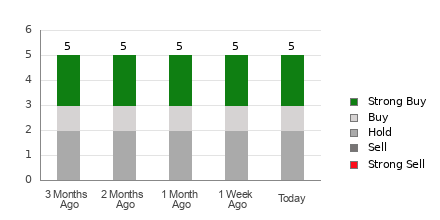The recommendations of Wall Street analysts are often relied on by investors when deciding whether to buy, sell, or hold a stock. Media reports about these brokerage-firm-employed (or sell-side) analysts changing their ratings often affect a stock's price. Do they really matter, though?
Let's take a look at what these Wall Street heavyweights have to say about IonQ, Inc. (IONQ) before we discuss the reliability of brokerage recommendations and how to use them to your advantage.
IonQ currently has an average brokerage recommendation (ABR) of 2.00, on a scale of 1 to 5 (Strong Buy to Strong Sell), calculated based on the actual recommendations (Buy, Hold, Sell, etc.) made by five brokerage firms. An ABR of 2.00 indicates Buy.
Of the five recommendations that derive the current ABR, two are Strong Buy and one is Buy. Strong Buy and Buy respectively account for 40% and 20% of all recommendations.
Brokerage Recommendation Trends for IONQ

Check price target & stock forecast for IonQ here>>>
The ABR suggests buying IonQ, but making an investment decision solely on the basis of this information might not be a good idea. According to several studies, brokerage recommendations have little to no success guiding investors to choose stocks with the most potential for price appreciation.
Do you wonder why? As a result of the vested interest of brokerage firms in a stock they cover, their analysts tend to rate it with a strong positive bias. According to our research, brokerage firms assign five "Strong Buy" recommendations for every "Strong Sell" recommendation.
In other words, their interests aren't always aligned with retail investors, rarely indicating where the price of a stock could actually be heading. Therefore, the best use of this information could be validating your own research or an indicator that has proven to be highly successful in predicting a stock's price movement.
Zacks Rank, our proprietary stock rating tool with an impressive externally audited track record, categorizes stocks into five groups, ranging from Zacks Rank #1 (Strong Buy) to Zacks Rank #5 (Strong Sell), and is an effective indicator of a stock's price performance in the near future. Therefore, using the ABR to validate the Zacks Rank could be an efficient way of making a profitable investment decision.
Zacks Rank Should Not Be Confused With ABR
Although both Zacks Rank and ABR are displayed in a range of 1-5, they are different measures altogether.
The ABR is calculated solely based on brokerage recommendations and is typically displayed with decimals (example: 1.28). In contrast, the Zacks Rank is a quantitative model allowing investors to harness the power of earnings estimate revisions. It is displayed in whole numbers -- 1 to 5.
Analysts employed by brokerage firms have been and continue to be overly optimistic with their recommendations. Since the ratings issued by these analysts are more favorable than their research would support because of the vested interest of their employers, they mislead investors far more often than they guide.
In contrast, the Zacks Rank is driven by earnings estimate revisions. And near-term stock price movements are strongly correlated with trends in earnings estimate revisions, according to empirical research.
Furthermore, the different grades of the Zacks Rank are applied proportionately across all stocks for which brokerage analysts provide earnings estimates for the current year. In other words, at all times, this tool maintains a balance among the five ranks it assigns.
Another key difference between the ABR and Zacks Rank is freshness. The ABR is not necessarily up-to-date when you look at it. But, since brokerage analysts keep revising their earnings estimates to account for a company's changing business trends, and their actions get reflected in the Zacks Rank quickly enough, it is always timely in indicating future price movements.
Is IONQ a Good Investment?
Looking at the earnings estimate revisions for IonQ, the Zacks Consensus Estimate for the current year has declined 2.4% over the past month to -$0.86.
Analysts' growing pessimism over the company's earnings prospects, as indicated by strong agreement among them in revising EPS estimates lower, could be a legitimate reason for the stock to plunge in the near term.
The size of the recent change in the consensus estimate, along with three other factors related to earnings estimates, has resulted in a Zacks Rank #4 (Sell) for IonQ. You can see the complete list of today's Zacks Rank #1 (Strong Buy) stocks here >>>>
Therefore, it could be wise to take the Buy-equivalent ABR for IonQ with a grain of salt.
Must-See: Solar Stocks Poised to Skyrocket
The solar industry stands to bounce back as tech companies and the economy transition away from fossil fuels to power the AI boom.
Trillions of dollars will be invested in clean energy over the coming years – and analysts predict solar will account for 80% of the renewable energy expansion. This creates an outsized opportunity to profit in the near-term and for years to come. But you have to pick the right stocks to get into.
Discover Zacks’ hottest solar stock recommendation FREE.IonQ, Inc. (IONQ) : Free Stock Analysis Report
To read this article on Zacks.com click here.
The views and opinions expressed herein are the views and opinions of the author and do not necessarily reflect those of Nasdaq, Inc.


